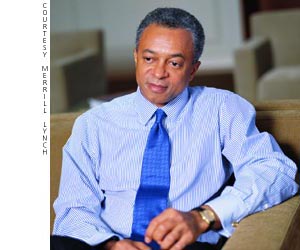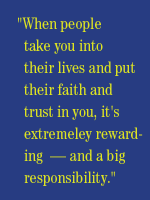Game Theory
Platinum Member
- Sep 5, 2006
- 8,545
- 835
Stan O'neil, Johnie Cochran na Condi Rice (japo nina matatizo na some aspects za politics zake lakini ninamheshimu kama academician mzuri) ni watu wachache ambao i have always looked up to. Nakumbuka nilikuwa nakesha kumtazama Johnie Cochran alipokuwa anawapeleka puta akina Marcia Clarke wakati wa kesi ya OJ kwenye TV na ndiye alinipa hamu ya kwenda law school.

Btw Kuna habari kuwa Stan O'Neil will go na jamaa wa MERRILL LYNCH wanaweza kua announce hii by kesho asubuhi.This man has always made me proud! Huyu jamaa babu yake yake alikuwa anapick cotton kwenye slave plantation kule Alabama na ameweza kuraise up all the way to the top of one of the most prestigious corporations in America
Huyu jamaa ni kielelezo tosha kuwa sometimes hard work pays na hasa katika hizi nchi zilizoendelea. Kwa watu mliosoma Finance mnasemaje kuhusu hili? najua kuna wengi watasema hii inatokana na mamabo ya subprime let down in the States.
Now the real question is will the new CEO really be able to get too aggressive with write-downs without impairing ML's ability to quickly drive earnings (versus competitors who are much slower to 'mark to market')?
It will be interesting to see who decides to captain a ship that is taking on substantial water in the middle of a storm that appears to be getting worse...
Your views plse
Source:
http://www.alumni.hbs.edu/bulletin/2001/june/profile.html

Btw Kuna habari kuwa Stan O'Neil will go na jamaa wa MERRILL LYNCH wanaweza kua announce hii by kesho asubuhi.This man has always made me proud! Huyu jamaa babu yake yake alikuwa anapick cotton kwenye slave plantation kule Alabama na ameweza kuraise up all the way to the top of one of the most prestigious corporations in America
Huyu jamaa ni kielelezo tosha kuwa sometimes hard work pays na hasa katika hizi nchi zilizoendelea. Kwa watu mliosoma Finance mnasemaje kuhusu hili? najua kuna wengi watasema hii inatokana na mamabo ya subprime let down in the States.
Now the real question is will the new CEO really be able to get too aggressive with write-downs without impairing ML's ability to quickly drive earnings (versus competitors who are much slower to 'mark to market')?
It will be interesting to see who decides to captain a ship that is taking on substantial water in the middle of a storm that appears to be getting worse...
Your views plse
STAN O'NEIL PROFILE:
The path from the rural South to the upper echelons of Wall Street is not heavily traveled. Indeed, E. Stanley ONeal (MBA 78) is surely the only person who has made the journey from the fields of Wedowee, Alabama where he labored on his grandfathers farm picking corn and cotton to the 32nd floor of Merrill Lynch headquarters at Manhattans World Financial Center.
As president of Merrills U.S. Private Client Group, ONeal oversees sixteen thousand brokers or financial advisors, as he calls them in eight hundred branch offices. Also an EVP and a member of the Merrill Lynch Executive Management Committee, ONeal is one of the firms top officers and is frequently mentioned as being on the shortlist to be the next chairman of the 150-year-old firm.
My father told me I wasnt cut out for farm work, says ONeal, whose easy smile and relaxed demeanor almost belie his stature in the pinstriped, power-brokering world of Wall Street. I never took it as an insult. Seated in a conference room with an expansive view of the Hudson River, ONeal recalls that work was hard to come by in Wedowee, population 750, and the options, particularly if you were poor and black, were limited. ONeals mother worked as a domestic, cleaning houses, and when he wasnt harvesting crops with his three younger siblings, he sold and delivered newspapers.

As it turned out, his father wasnt cut out for farming either, and when ONeal was 12, his family moved to a housing project in Atlanta, where his father eventually landed a job at a General Motors factory in Doraville. Stan ONeal attended the General Motors Institute (which later became Kettering University), a co-op program where he alternated between studying engineering and industrial administration and working in the Doraville plant. ONeal, the first in his family to finish college, says of his undergraduate days, I really didnt have an understanding of the world or any role models, but I had a strong desire to learn, and I think that is what pulled me through. After graduating in the top 20 percent of his class, ONeal returned to Doraville, working as a supervisor at the GM facility. When he was accepted at HBS, GM gave him a no-strings-attached scholarship.
I was naive, but I was also undaunted, says ONeal of his arrival at Soldiers Field his first trip to Boston. I had never had a set of peers like that. They were an extremely sophisticated group who knew about the world, and they really motivated me. One of only a few African Americans in his class, ONeal says simply: Not a lot of people looked like me.
That was also the case in the treasurers office at GM in New York, which he joined after graduating with honors from HBS. After eight years with GM including a stint as treasurer of GM España in Madrid ONeal had cultivated an appetite for the deals business. So when Merrill Lynch came knocking, he gladly opened the door, accepting a position as VP of the firms high-yield business. I knew it was a great fit for me, he says.
During the fifteen years he has worked at Merrill, ONeal has proved himself again and again, moving from various positions in different divisions of the firm financial services, global capital markets, investor strategies, corporate and institutional clients, and corporate services. In 1998, Merrill chairman and CEO David H. Komansky (107th AMP) asked him if hed consider being CFO. This was an opportunity to see the whole firm comprehensively, observes ONeal, who accepted the offer despite never having looked at Merrills balance sheet and knowing that insiders considered the CFO position a thankless assignment. Im a sucker for learning opportunities, he adds, and this was one I couldnt pass up.
After two years as CFO, ONeal rose to his current post, making him the first-ever nonbroker to head the firms brokerage business. This is the best job Ive ever had, and Ive had a lot of good ones, ONeal says, explaining that the rewards, challenges, and people are what keep him most interested. Those challenges include competing for clients in a saturated market, finding ways to serve a more sophisticated group of clients, and continuing to improve the quality of service provided. We have a tremendously successful organization with a legacy of winning. The challenge is to continue to evolve and adapt to the new realities of the marketplace. ONeal cites Merrills Financial Advisory Center and Merrill Lynch OnLine as examples of how the firm has responded to clients changing needs.
While his future looks bright at Merrill, ONeal doesnt speculate about whether he will be asked to take its helm, a move that would make him one of the highest-ranking African Americans on Wall Street. He prefers instead to concentrate on his progress in his current position. I think we are 75 percent of the way there in terms of laying the foundation for client services, but were probably 25 percent in terms of achieving all the things we want to. There is no shortage of challenges or rewards here.
Outside the office, ONeal says he sometimes finds time to play a bad game of golf. He is a member of the HBS Visiting Committee and sits on the boards of the Ronald McDonald House, the National Urban League, and Nasdaq. Recently, he also joined an advisory board of the American Cancer Society to help lessen the racial divide in cancer mortality rates. We as a society have the capability to provide much greater care, he says. Its a matter of marshaling focus and resources. There is an enormous amount of good that can be done.
ONeal is still very close to his extended family, whom he sees twice a year when he and his wife, Nancy Garvey, take their twins to visit Roanoke, Alabama (the town in which he was born, he notes, because the Wedowee hospital didnt serve African Americans). He puts his pride in raising his 10-year-old son and daughter above all his other accomplishments. His goal is to provide them with the same strong sense of morals that his parents instilled in him. I think life is about doing the best that you can with what you are born with, he remarks. Its a fascinating journey to discover what that is.
Source:
http://www.alumni.hbs.edu/bulletin/2001/june/profile.html
